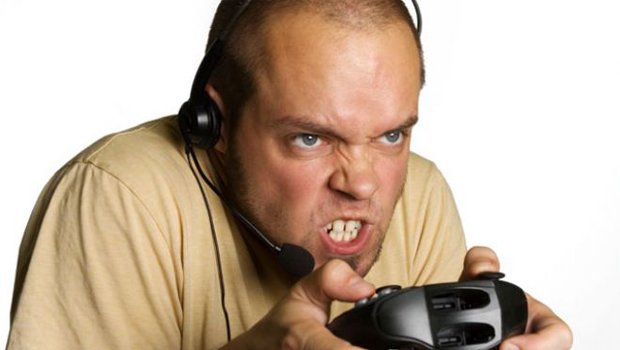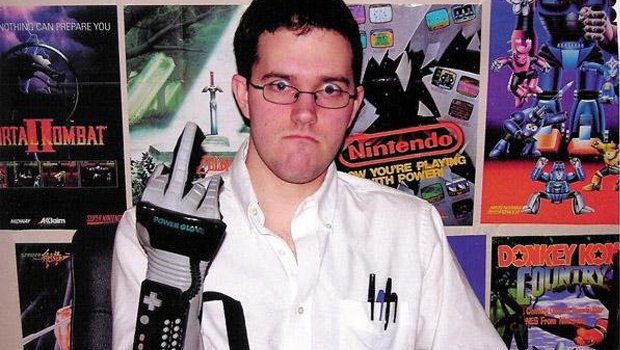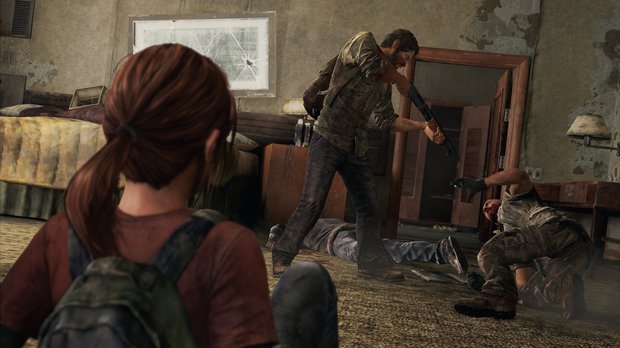We need to kill the 'angry gamer' archetype
Core gamers, without a shadow of a doubt, are the most aggressive, self-serving, knee-jerk murderous people the universe has ever seen. We’re effectively less shock-resistant Daleks, our incendiary utterances translated into the same monotone, staccato bark each and every time we HIT THE. CAPS LOCK KEY. AND. JETTISON. ALL. CORRECT. GRAMMAR. But of course, you know that. You’re probably reading this with a smart phone in each hand, typing out a furious forum comment with your left and a death-threat tweet to a developer with your right, struggling to make out the words in front of you through the perpetual murder-haze blighting your rage-vibrating eyeballs. Like some kind of angry Jesus on a techno-crucifix of holy fury.

But of course, the above is--to a certain degree--almost certainly untrue. I’m not for a second going to pretend that the gaming community is a blessed-out bunch of doped-up Eloi, playing harps while receiving shoulder massages around a pristine communal bong. Core gamers are notorious for self-righteous, unacceptably aggressive online outbursts, often directed towards developers and publishers with very personal venom. Look at the abuse Call of Duty Design Director David Vonderhaar got over a few Black Ops 2 balancing tweaks. Look at the disgusting tirades against (now-ex) BioWare writer Jennifer Hepler following the release of Dragon Age 2. Look at poor old Phil Fish. And most recently, look at the opinion-lava spurting furiously from the glowing mouths of the many core gamers populating Kim Kardashian fandom.
Yeah, back up a moment. Because obviously I’m making a point with that last example. You might be aware that the Kim Kardashian: Hollywood mobile game is currently raking in more money than an ice cream van on the surface of the sun. You might be aware that it’s currently set to make its ‘star’ around $85 million this year. But you might not know that, instead of going about her usual day-to-day business as a perpetual feedback loop for unfounded celebrity, everyone’s favourite walking-billboard-for-herself has been coming in for some severe Twitter-flak since the weekend. Moreso than usual.
You see the free-to-play adventure game/dress-up simulator crashed a few days ago, and lo, a great many voices did swirl around Kardashian’s personal @ccount, like so many Nazi-melting furies at the end of Raiders of the Lost Ark. It all got very nasty. It all got very personal. It all got a bit like this.

The usual gamer backlash on the internet then. Except that it wasn’t. These weren’t grumpy, aggressive, bedroom-dwelling, teenage Call of Duty players. They weren’t the self-entitled, Comic Book Guy-style nerd experts, spouting anally-retentive derision at a change in the canon of their favourite RPG series. They were the sort of people who play casual, celebrity-endorsed mobile games. They were the sort of people who think that Kim Kardashian both develops and maintains those games single-handed. They were the sort of people who pay attention to Kim Kardashian’s existence. And here’s where I think it starts to become fairly clear that we’re not dealing with a social problem within core gamers specifically. Rather, we’re dealing with a social problem within human beings in general. A lot of them are pretty shit, and rather noisy with it.
But that doesn’t let us off the hook. Not any more than the excuse of ‘But all my clones are just as bad!’ pardoned the Imperial Troopers who killed Luke Skywalker’s Aunt Beru and Uncle Owen. We can’t control the behaviour of everyone else on the internet (and everyone from reality TV viewers to Doctor Who fans question their community’s mothers’ morals on a regular basis), but that only makes it even more important that we remain accountable for our own. And as I’ve already established, we have a bit of a rep for being gobby arseholes. So let’s just address that shall we?
To do that, I think we--aside from generally calming the hell down and just becoming better at functioning as civilised people--need to look at the circumstances that spawned this culture of lunatics. Because while the notion that games create aggression is naught but the most ribald codshit, certain elements of gaming culture do encourage this crap.
Weekly digests, tales from the communities you love, and more

Take, for instance, the jabbering horde of identikit, angry bellow-men making up a significant quota of the gaming ‘personalities’ outside of traditional journalism. They stand there in their legions, indistinguishable of face but strong of number, like rows of red-headed sunflowers in an endless field of generic, non-specific outrage. Pull up Thesaurus.com, pick any synonym for ‘angry’, stick it in front of the word ‘gamer’ in a Google search box, and you’ll almost certainly find some grunting fury-pump gushing out acrid globs of faux-rage about something related to electronic amusements.
I get why there are a lot of them. It’s easy. Or at least it looks like it is. Certain internetters, like Yahtzee Croshaw, Jim Sterling and The Angry Nerd did a great job of using comedic outrage to make strong points about game design and the industry at large as games culture was really kicking off online. British journalist Charlie Brooker has also been fantastic at aiming the technique at TV. But as effortless as the good stuff inherently looks, it takes a fair degree of skill, in both writing and delivery, in order to imbue it with real, meaningful content.
Anger is one of the simplest emotions to convey and relate to. It’s unambiguous, it’s immediate, and it generally doesn’t come with a great deal of nuance, or layers in need of deciphering. Anyone can comprehend it on a direct, primal level. But unless you’re really good, and--ironically--rather thoughtful about it, it’s really hard to make work on anything other than a superficial level.

For all the reasons above, it remains a popular, go-to angle online, but for all the reasons above, there’s rather too much of it, and rather too much that isn’t great. But still, it informs a lot of the approach that gamers take to their hobby and the industry responsible for it. As games commentary matures, we need less default anger. We need more varied, more tonally and intellectually distinct approaches to coverage, and more people bringing unique and considered angles.
And then there are the problems within the games industry. Subtle ones, but problems which I suspect have an attritional bleed-through effect on the general gaming attitude. Every E3, we’re told that badassery is the one true path. Thoughtful, meaningfully violent games like The Last of Us are demoed as shotgun-porn. Long-standing stealth series like Splinter Cell are reconfigured on-stage as a roaring carnival of Brutal Melee Takedowns™. Intelligent, adult developers discuss their games in air-punching, bro-fisting, pseudo-teen speak. None of it is helping, All of it is compounding the idea that shallow aggression is the default means through which to appreciate games.

I’m not pretending that we can fix this overnight. And I’m not ever going to pretend that we’ll stamp out 100% of the mindless bile and personal abuse festering congealed in the corners of the internet’s comment boxes. Like I said, a lot of people are just a bit shit. But we all, gamer, commentator, publisher and developer alike, need to stop simply talking the talk of games as a mature, mainstream entertainment medium. We need to put on our boots (military or decoratively fashionable) and get walking. Ideally in careful steps, of a sensible volume, so as not to rudely rattle the floorboards or squash anyone’s toes.
We all deserve better, and beyond that, games themselves deserve better too.



